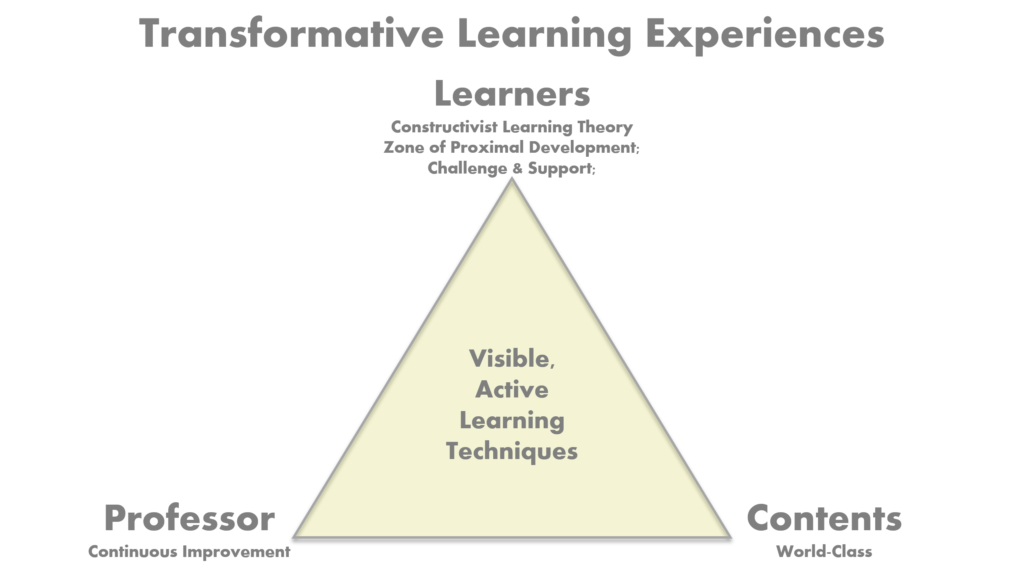Reimagining business education for the 21st century.
01.
Introduction
This website introduces the teaching and research activities of Prof. Sean M. HACKETT, Ph.D., an American business professor based in Tokyo, Japan with strong ties to several universities in North America.
***
I am a professor of Management; my academic homes at the Academy of Management – a global, professional association for management and organization scholars – are the Technology & Innovation Management Division, the Entrepreneurship Division, and the International Management Division. I began teaching in universities in 2001.
Since 2011 I have been adapting courses, contents, and teaching and learning techniques from top-tier, global business schools for use in Higher Education and Executive Education settings in Tokyo, Japan and remotely via Zoom & CANVAS LMS.

As indicated in the figure above, my experience has taught me that visible, active learning and teaching techniques connect motivated Learners, world-class Contents, and a Professor committed to continuous improvement in ways that can lead to Transformative Learning Experiences.
Why is Transformative Learning important? Because Transformative Learning makes innovation and progress possible by enabling
“a perspective shift – a new way of seeing the world – by providing us with the opportunity to become aware of the interpretations and beliefs we hold as ‘the way it is'” presenting us with “the opportunity to critically reflect on the underlying ideas, beliefs, biases, prejudices, social and cultural embedded-ness, and taken-for-granted assumptions that constitute
– Jack Mezirow and Associates Learning as Transformation (2000)
1) our worldview (mental model of reality), including our worldview about ourselves, others, the world in which we live and work, and
2) our frame of reference (mindset) relative to this subject or that subject.”
02.
Teaching & Research
My teaching and research interests are at the intersection of strategy, innovation, and entrepreneurship, with a focus on how digitalization transforms existing businesses and makes new businesses possible.
At the center of these interests is a fundamental concern for helping students and professionals to acquire knowledge about management while improving
1) the quality of their thinking skills and communication skills;
2) their ability to make ethically-informed decisions; and
3) their ability to take prudent, principled, strategic actions in an increasingly globalized and uncertain world.
with the aim of helping learners to prepare to live a good life while improving the likelihood of being able to advance their career.
If you are wondering about the skills you will need to advance your career, then I recommend Defining the skills citizens will need in the future world of work by McKinsey & Company’s Marco Dondi, Julie Klier, Frédéric Panier, and Jörg Schubert.
Learners who are interested in maximizing their opportunities to learn should keep the following quote in mind:
“Five best-practice behaviors help intentional learners get the most out of their experiences: setting goals, protecting time for learning, actively seeking feedback, conducting deliberate practice, and reflecting to evaluate yourself and determine your progress.”
– Lisa Christensen, Jake Gittleson, and Matt Smith
Finally, I believe that anyone engaged in the profession of teaching and facilitating learning in higher education and in corporate education needs to be familiar with the following texts:
- Wiggins, G., & McTighe, J. (2005). Understanding by design. ASCD.
- Ambrose, S. A., Bridges, M. W., DiPietro, M., Lovett, M. C., & Norman, M. K. (2010). How learning works: Seven research-based principles for smart teaching. John Wiley & Sons.
- Christensen, C. R. (1991). Education for judgment: The artistry of discussion leadership. Harvard Business School Press, Boston, MA 02163.
- Mezirow, J. (1991). Transformative dimensions of adult learning. Jossey-Bass, 350 Sansome Street, San Francisco, CA 94104-1310.
- Tokuhama-Espinosa, T. (2021). Bringing the neuroscience of learning to online teaching: an educator’s handbook. Teachers College Press. 110 pp.
- This book leverages MBE — Mind (psychology), Brain (neuroscience, genetics), and Education (pedagogy – “methods, practices, activities, and strategies that teachers apply to help learners achieve their maximum potential”) — science which asks the question, “What do we really know about human learning and how the brain functions, and what can be leveraged within our classrooms to better improve learning outcomes?”